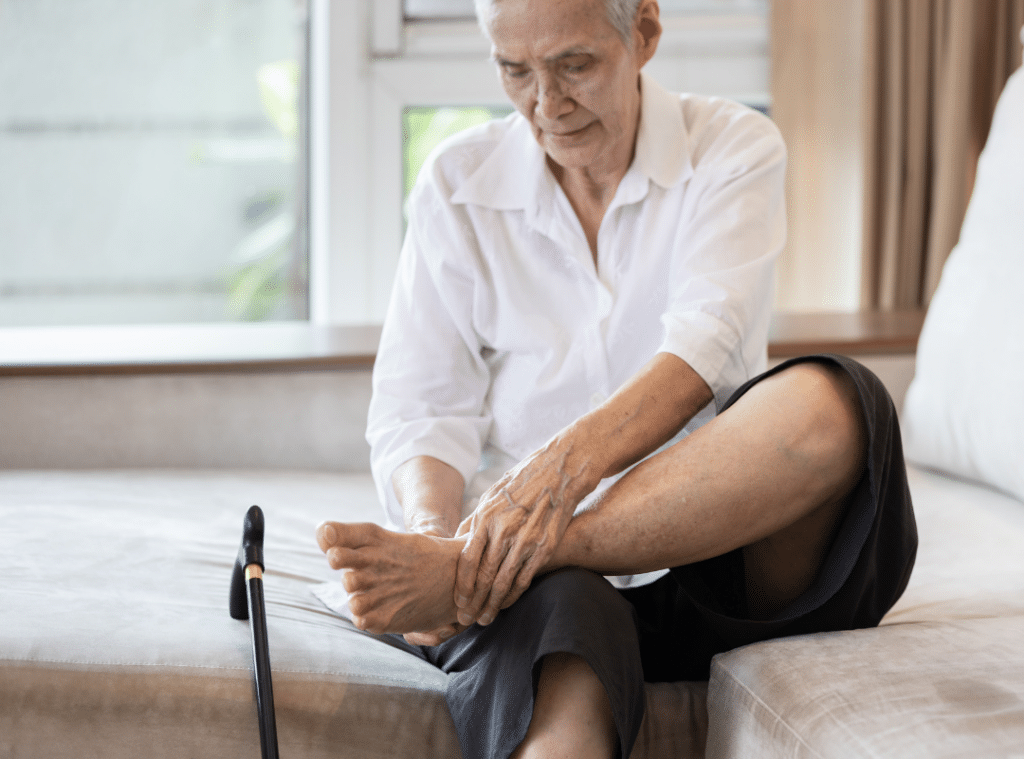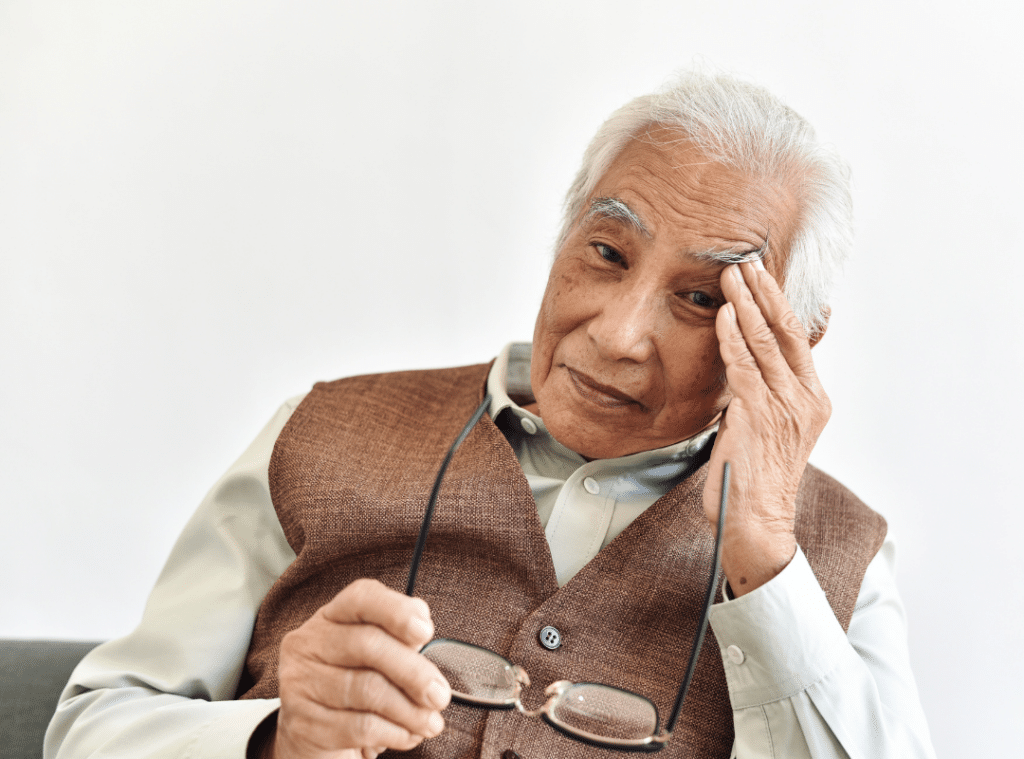Understanding Anxiety and Nerve Problems in Seniors
Many older adults are surprised when physical symptoms like tingling, numbness, or sharp pains appear during stressful moments. These sensations often raise concerns about nerve damage, but sometimes, they may be caused by something else entirely—anxiety and nerve problems.
Anxiety doesn’t just live in your thoughts—it can live in your body. For seniors, it’s essential to recognize how emotional health can mimic physical illness, especially in ways that resemble neuropathy. Whether it’s nerve tingling in your legs or tightness in your face, anxiety may be the hidden culprit. If you’re asking, can anxiety cause nerve pain in legs, the answer is yes, but the pain is typically not due to damage—instead, it’s your nervous system reacting to prolonged stress.
At Lakeview Senior Living, we prioritize helping seniors differentiate between actual nerve conditions and anxiety-driven sensations. Understanding the root of these feelings is the first step to finding relief and peace of mind.
How Anxiety Mimics Nerve Pain
It’s natural to question, can anxiety cause nerve pain in the face or other areas of the body? The reality is that anxiety can trigger a variety of nerve-like symptoms. These include tingling, burning, and numbness in the extremities, sometimes leading people to believe they’re experiencing peripheral neuropathy.
What’s happening is a surge in your body’s stress hormones, such as adrenaline, which overstimulates your nervous system. The result can feel identical to actual nerve pain, even though there is no physical damage. Seniors experiencing these symptoms may develop what’s known as anxiety neuropathy symptoms, where emotional distress produces physical sensations that mimic neuropathy.
This overlap can be distressing, but being informed helps. Consulting a medical professional ensures that the symptoms are correctly evaluated, helping determine whether it’s anxiety, actual nerve damage, or a combination of both.
Recognizing Anxiety Neuropathy Symptoms Early
The best way to manage this issue is to recognize anxiety neuropathy symptoms as early as possible. These may include sensations like pins and needles, shooting pain, or numbness that coincides with high-stress moments or panic attacks.
When these symptoms appear suddenly and without an underlying medical condition, anxiety is often a substantial contributing factor. For example, someone might experience numbness in their legs during overwhelming stress, prompting them to ask, How to stop anxiety nerve pain before it escalates.
Understanding the connection can prevent unnecessary worry and allow individuals to seek proper treatment for their anxiety. One helpful resource on this topic is Unraveling Anxiety in Older People, which outlines ways to identify and manage anxiety-driven symptoms in seniors.
Managing Anxiety-Induced Nerve Pain Naturally
Managing anxiety and nerve problems doesn’t always require medication. Many seniors can improve their symptoms through lifestyle changes and relaxation techniques. Deep breathing exercises, mindfulness practices, and gentle movement can help regulate your nervous system. If you’re wondering how to stop anxiety nerve pain, start by calming the mind.
One study from Harvard Health explains how anxiety-related disorders can heighten physical awareness, which can in turn amplify perceived discomfort. This “feedback loop” between mind and body makes managing anxiety even more essential when dealing with nerve-related sensations.
Still, there are times when symptoms are persistent and need medical support.
Exploring Anxiety Nerve Pain Medication Options
When holistic approaches aren’t enough, you might want to consider anxiety nerve pain medication. These can include antidepressants, anticonvulsants, or even certain types of anti-anxiety drugs that reduce the nerve’s overreaction to stress.
That said, medication should always be discussed with your healthcare provider. They’ll help determine if you’re experiencing anxiety alone or if it’s paired with an underlying condition. Remember, anxiety nerve pain medication isn’t a one-size-fits-all solution—it’s about finding what works best for your mind and body together.
For additional support, Steps for Managing Anxiety in Seniors offers guidance on integrating treatment plans into your daily life.

Can Anxiety Cause Nerve Pain in the Legs and Face?
Yes, both the legs and face can be affected. If you’ve been wondering, can anxiety cause nerve pain in the legs? This sensation is relatively common among those experiencing chronic stress or panic. The same is true if you’re asking, can anxiety cause nerve pain in the face, especially around the jaw, forehead, or cheeks?
These areas are susceptible to muscle tension and nervous energy. When stress accumulates, it can radiate outward, creating discomfort in localized parts of the body. The pain might feel sharp, dull, or throbbing—and yet, there’s often no medical explanation outside of anxiety itself.
Lakeview Senior Living staff are experienced in helping residents identify these sensations, talk through their worries, and explore personalized wellness strategies.
Living Comfortably With Support at Lakeview
Navigating anxiety and nerve problems doesn’t have to be a solo journey. At Lakeview Senior Living, we understand the unique mental health challenges faced by older adults. Whether you’re adjusting to a new stage of life or coping with stress that has followed you for years, we’re here to help.
Our approach includes emotional wellness support, staff trained in anxiety symptom management, and community programs that promote calm and connection. We encourage residents to speak openly about their physical and emotional concerns—no judgment, just care.
If you’re seeking peace of mind and a comfortable, compassionate environment, we invite you to schedule a tour today and see how Lakeview can support you or your loved one.
Dive into the vibrant life our Westmont communities have to offer.Find Where You Belong
Frequently Asked Questions
Can anxiety cause nerve issues?
Yes, anxiety can contribute to nerve-related symptoms. It may lead to sensations such as tingling, numbness, or a “pins and needles” feeling, often caused by hyperventilation or increased muscle tension. These symptoms are typically not harmful but can be distressing and mimic more serious conditions. Managing anxiety can frequently help reduce these nerve sensations.
What is the best cure for severe anxiety?
There is no one-size-fits-all cure, but effective treatments for severe anxiety often include a combination of therapy and medication. Cognitive Behavioral Therapy (CBT) is a widely recommended approach that helps individuals change negative thought patterns. Medications such as SSRIs or benzodiazepines may be prescribed for more immediate relief. Lifestyle changes like regular exercise, mindfulness, and sleep improvement can also support long-term recovery.
What is the 333 rule for anxiety?
The 333 rule is a grounding technique for calming anxiety and bringing focus back to the present moment. It involves identifying three things you can see, three things you can hear, and moving three parts of your body. This method helps redirect the mind away from anxious thoughts and provides a sense of control. It’s a simple yet effective tool for moments of high stress.
What are the symptoms of neurological anxiety?
Neurological anxiety refers to anxiety that produces symptoms mimicking neurological conditions. Common signs include dizziness, headaches, muscle weakness, tingling or numbness, and difficulty concentrating. These symptoms are usually a result of the body’s stress response rather than an actual neurological disorder. A medical evaluation can help rule out other causes and confirm anxiety as the underlying issue.








